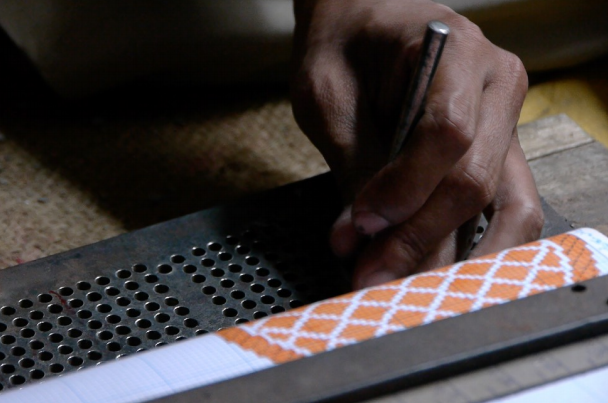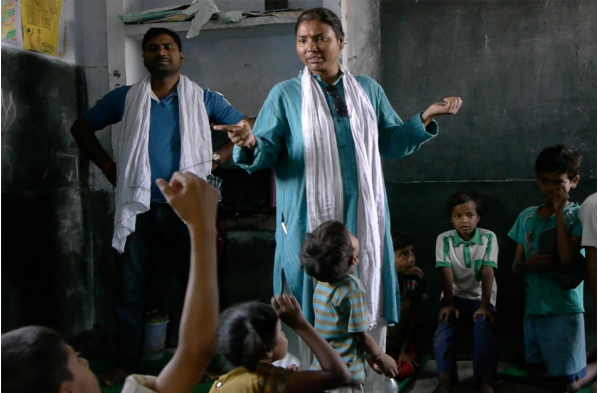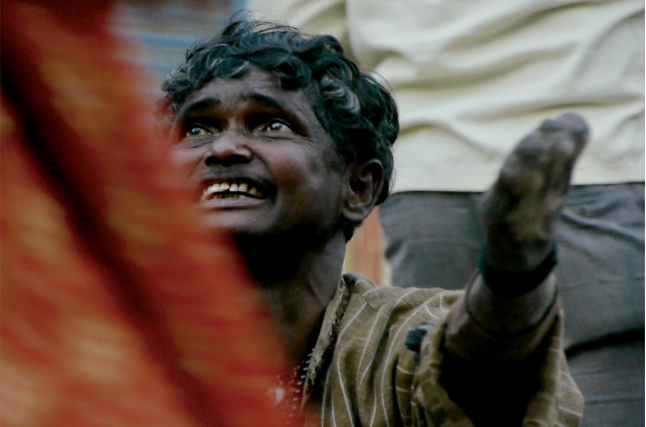The End and the Means by Pawel Wojtasik (116 minutes 2018)
Shot primarily in Varanasi, India’s oldest and holiest city, the film’s theme is work, but work as understood as devotion. Five years in the making, it consists of meditative portraits of a broad range of laborers, such as a crane operator, a surgeon, a weaver, a priest, a masseur, a tabla drum maker, and so forth. The camera enters into an intimately attentive relation with the subjects and their workplaces: a cremation ground, a hospital, a laboratory, a high-tech satellite TV station, an apartment tower under construction. The streets of the city themselves form an important worksite, where much of the activity takes place: a barber, a beggar, a dentist. The singular portraits of workers build towards an overarching vision of society as a roiling hive where each has a place in the totality of human endeavor.
Mike: Wow, that’s a tough film. That excruciating scene with the teeth. So much rough handling, carelessness, harshness. To have a stranger’s hands in your mouth, it’s so much. And that shit handling episode. I have to think of it whenever I’m feeling things are hard. I can feel throughout your steadiness of approach, the same even-handed and compassionate looking, from the side so often, allowing the subjects to maintain some of their mystery, their secrets. and the emphasis on context, medium shots, allowing the background to seep in and become part of each portrait, it feels more necessary now than ever, these pictures of the underclass. So many kids doomed to a life of service, bending, servile, so that others like me can float above it all.
Pawel: Oh Mike, I am so moved by your close and generous looking at the film! Thank you. I am struck by how radically different your reaction is from many other viewers. You responded to the suffering, indignity and injustice that you perceived in the street dentist scene, for example. Many have observed that the dentist and the girl are in a symbiotic relationship, both intent on restoring her beauty, her humanity even. The rough treatment is read by those viewers as an expression of the dentist’s devotion to his patient, his passion for his task – assisting the young woman in her struggle for dignity. Those dentures may grant her an honorable place in society, maybe a husband, or a job. Definitely greater acceptance by society. So his apparent abuse may be benevolent. Or there are several levels at play here, and we choose to focus on some over others.
Also, the cow dung collectors may not be as unhappy as we might think. After all, the cow is holy, highest in the social hierarchy, humans are second, then monkeys, then dogs. Their dung is considered clean, having the power to change a desert soil into fertile soil, where plants can grow. It can be used as fuel, as the next segment shows. So these ladies have an important part to play in the functioning of the city of Benares. The fuel they collect is used to make silver wire, which is used (after some further processing) in weaving of saris – one of the main industries there.
I appreciate your comments about allowing the subjects to be, granting them a level of mystery. Some viewers complained that I did not translate the words, for example of the teacher, as she is putting the kids in a trance state. I had every word in the film translated, but chose not to use subtitles, because I felt that would not add anything significant to what is being presented.
While I do portray quite a few from the lowest caste or untouchables ( for example the cremation workers ), I would hesitate to call their lot “servile”. India is a culture apart, the injustices are horrendous by our standards, but the Indians have ways to overcome them. One of them is the so-called yoga of work, or karma-yoga. According to its proponent, Vivekananda, who was a precursor of Gandhi, by the way, a person can achieve liberation not just through meditation and religious practices. Work and taking care of one’s business is another way, it would be via activa as opposed to via negativa of contemplation of the sadhu (holy man). The work could be of the “lowest” kind, gathering dung, let’s say, or being the ruler of a nation, it does not matter. Your chances of liberation are exactly the same. So I was investigating this, and in fact found many who have achieved some measure of grace.
Mike: I hear you about the complexities. The local frames and reframings. But when I was watching the lady handling that shit I wondered: would I let her put those fingers in my mouth? Could I go to sleep with her, fall in love with her, wake up beside her knowing that this smell would accompany her, accompany us, everywhere? And what about her kids, what might their lives be like? What prospects could be available for those whose mother not only has to work with her whole body all day but who would carry that smell to school when she picks them up, waiting with the other parents? What would that feel like?
Perhaps as you say it’s all a way of carrying out a larger project of liberation. But it looks like class war, a devastating and unending cruelty. Of course I am projecting. I am watching you, again and again, push me up against my middle class limits. The invitation, I think, is to put my bodies into the bodies on display: to wash that sheet, slaughter that chicken. Who said: in the cinema we watch 15 seconds of what people do all their lives? Though I am remembering something else that Godard said about work, without remembering it. That there is a veil or curtain behind which we are not allowed, as cinema goers, to enter. It is a kind of taboo I guess. But in this movie you plunge us into this realm without reserve, and emphasize most of all the body, its intensities and flows, its repetitions and variations, perhaps also its resistances.
The teeth yes i understand that she is fighting for a better life, a better mouth. I had a friend who lost many teeth and it became difficult to “see” them, in an instant I had pushed them into a different class and I was astonished to see myself do this. As if they suddenly belonged to another group (what group then was i part of?), which was “lower.” All of a sudden there were “levels,” heights and valleys. Teeth give entry to all this, i get that. But the way the street dentist touches his charge, with this cruelty in his fingers. I can feel the patriarchy at work, and then on the other side this touching support by her comrade, perhaps a friend or family member, who literally holds her up. That’s so powerful. It also says: you can endure what cannot be endured. I will help you find the other side.


